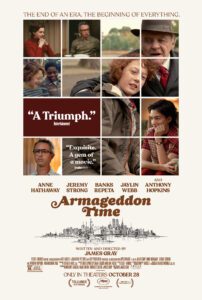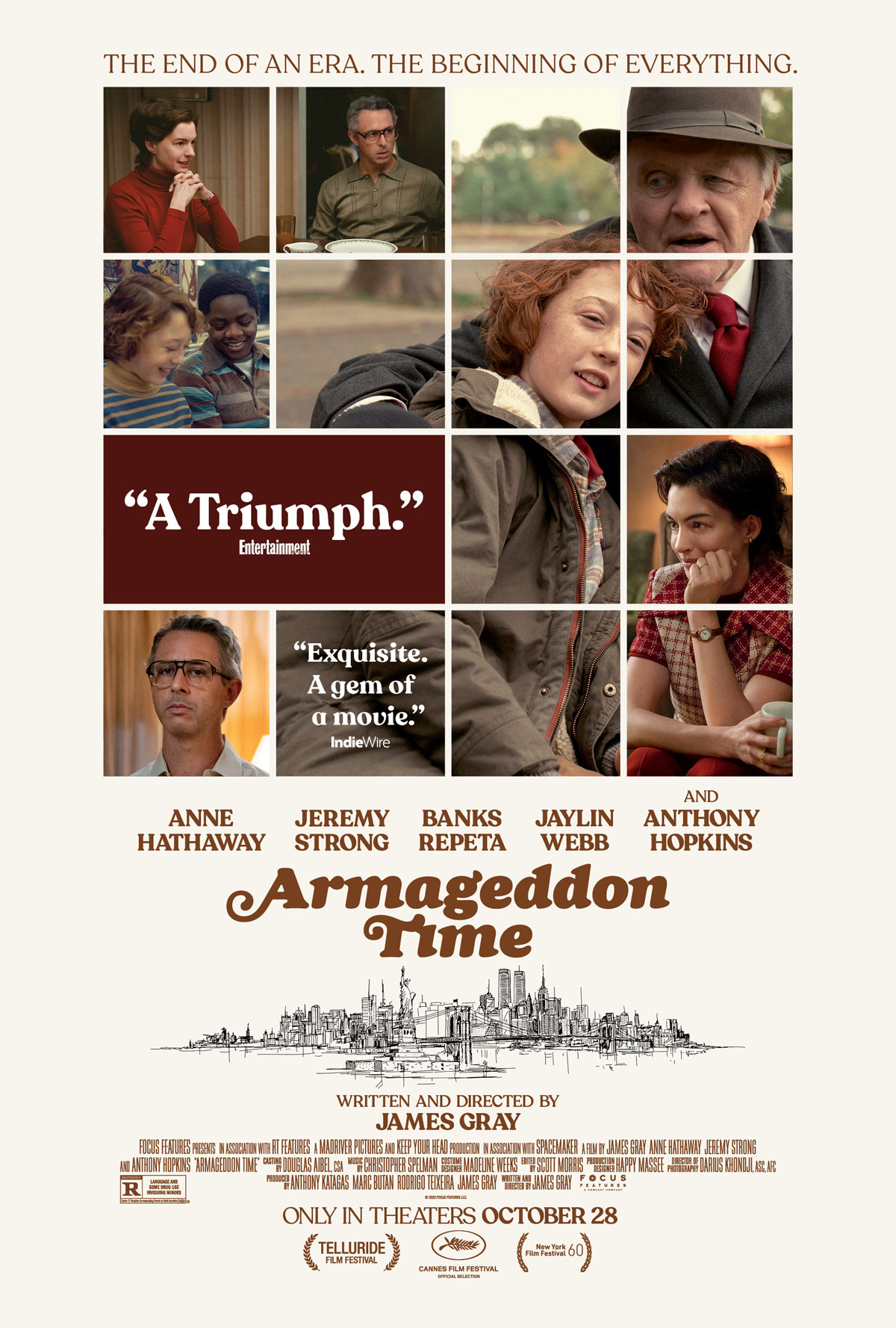
Director: James Gray
Release Year: 2022
Runtime: 1h 54m
There is a thin line between emotional and sappy. Between nostalgic and maudlin. Between acting and aaaacccctttiiinnnggg! Armageddon Time rides that line, and like a drunk driver swerves a bit, sometimes on one side of that line, sometimes heading directly into oncoming traffic. I suppose your enjoyment, like mine, may waver, dip and swell during its run time and only at the end of the trip will you know if you’ve arrived safely at home or ended up a fiery wreck on the metaphorical highway. Honestly, the most discordant thing for me is the actual use of The Clash cover of the song “Armagideon Time” in the film. I knew in my brain that it takes place in 1980, but the look and feel of the film — and its sepia-toned pall — couldn’t help but make it feel way more early 60s. The band and song also have absolutely nothing to do with the film and just doesn’t match its mood, themes or anything else when it blares out in the final scene. It was a honking note at the end of a movie with a very specific tone. And why a reggae song originally written and recorded by a Jamaican artist covered by a British rock band? In a story about a Jewish family in Queens? It’s confounding.
My issue with James Gray’s terrible needle drop acumen aside, he does make a nice looking movie. It is warm and professionally shot. Again, the rich tones and lots of darkness didn’t say 1980 to me, but it’s his story and presumably this is what Queens looked like at that time. My sun-drenched, Los Angeles existence at that time, not so much. Same backgrounds, but different lives, I suppose. Which leads to my constant complaint about these movies… Which is less egregious than casting Michele Williams in The Fabelmans, but would it kill you to cast one Jew in a movie that is literally centered around the characters being Jews? I know it’s Gray’s movie and his life and he can hire whomever he wants, but are we really supposed to pretend Anne Hathaway isn’t… well, Anne Hathaway? From top to bottom it seems almost like a conscious choice to eschew a rich stable of Jewish actors who could have brought some authenticity to these roles. Instead we get a person in Anthony Hopkins, who is inarguably a wonderful actor, but is about as Jewish as a ham and cheese sandwich on Wonder bread. He tries. Yes, he tries. And if this was a film not about the ongoing trauma of the Holocaust he would have been great. But, as it stands, this aging Welsh actor — for whom they need to make a really convoluted story arc to give him that accent — is not a man named Aaron Rabinowitz. Okay, I’ll stop now.
So, apparently this is an semi-autobiographical film for Gray. He too grew up in Queens in the 1980s in a borderline Jewish working-class / middle-class family. If his stand-in, Paul Graff (Banks Repeta), is any indication, he suffered from pretty severe ADD at the very least. Oddly the character comes off, at times, as mentally deficient. I’m not sure what the word would be for it, but it’s not a flattering depiction. Sometimes slack-jawed and often befuddled, he’s played a bit dim. And maybe that was an acting choice, but Paul is often portrayed as stuck in the mud mentally and constantly being a dumbass. It’s an odd choice. But I think the crux of the film is supposed to be the life of this family and this boy as they struggle to integrate and move up in society versus Paul’s new black friend at school, Johnny Davis (Jaylin Webb). The most generic young black man name ever. Which is an accurate description of both his name and his characterization. Such as it is. Because, of course, Gray can draw on a deep well for his family, but this black character kind of gets the bot treatment. The NPC depiction of a poor, black kid. Because he’s an idea and not a real human. An idea needing to exist to play off of the aspirations of this second and third-generation immigrant family to move further into the middle class. An option that Johnny and his ilk will never have. Because he, unlike the Graffs, will never “pass.”
This friendship between these boys sets the theme for the movie. In his integrated school Paul is fine. He’s a dummy, and not exactly killing it, but he could graduate and get a job fixing fridges like his father, Jeremy Strong. But that darned, troubled black kid convinces him to smoke a joint in the bathroom and he gets in trouble. But, of course, not as much trouble as the black kid who doesn’t have a family. Because Paul has options. And Johnny is ground up in the system and ends up a truant who apparently wanders around the neighborhood and lives in a shed in Paul’s backyard? While Paul is sent to some fancy-pants prep school that is financially supported by its benefactor and father of Donald, Fred Trump. A man who was sued by the government for his racist housing practices. A fact that is not lost on those of us who are aware of this assholery. The point of this whole thing is that being white and relatively affluent gives people options that being poor and black does not. Got it. At this prep school full of blonde children Paul is more aware of his Jewishness and is reminded of it by his fellow students. There is an incident of these same kids being racist about his old friend Johnny who just happens to wander by the school gate during his afternoon walk-about. Which prompts the moral center of the film: the talks with grandpa Rabinowitz. Who uses his experience running from Nazis and stuff to teach Paul that if you don’t stick up for your morals and your friends then all is lost. Or some such. Point being that Paul — this absolutely dim boy — should have said something to this group of dumb boys who used the n-word in reference to homeless Johnny. Because he has the benefit of being white and in that has the voice that Johnny does not. And if speaking up means a beating, so be it. Spoiler: Paul isn’t smart enough to take in this lesson and put it to use later.
The movie goes on to heighten this “lesson” from grandpa to almost silly proportions. Because, again, Paul is a dummy. Even Jeremy Strong, who is a really tightly wound piece of work, finally softens toward his son (whom he beats with a belt earlier) because he looks into those empty eyes and realizes he’s missing a chip. And, again, tries to impart the lesson that sometimes you need to step over the less fortunate to keep yourself afloat. Sorry, son, but we, as white people, have a natural advantage in this country that we didn’t back in Germany in the 1930s. So we need to lean in on our skin color, Anglicized last name and foot in the door to power at this Trump school to make our way up in the world. And, yes, this may end up sinking people like your old friend, Johnny, but this is newly Reagan’s America and it is what it is. Kind of a bleak lesson to take, but not an unrealistic one. As the grandchild of a man who Anglicized our incredibly ethnic name in a deli in Williamsburg in the 1940s, and attended fancy-pants schools growing up I can relate. So I get what Gray was going for here. I get the underlying theme and what he’s trying to say about his family and their ability to send him to the Trump school and eventually USC film school. While this clearly made-up, cardboard-of-a-character Johnny kid died penniless in 1985 in a half-way house five blocks from his former home. And all he wanted to do is work for NASA! Ultimately, I think there was something here, but the clumsiness of message, some questionable casting and an inexplicable use of a reggae tune bogged this thing down to the point it might not be worth your time.


